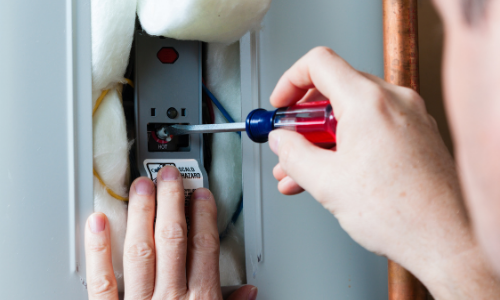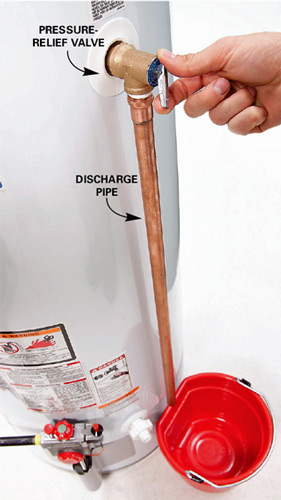Coping with the Most Frequent Hot Water Heater Emergencies
Coping with the Most Frequent Hot Water Heater Emergencies
Blog Article
They are making a number of great points regarding Warning Signs You Need Water Heater Repairs in general in this article below.

A hot water heater is among one of the most vital basic home appliances that can be discovered in a residence. With hot water heater, you do not need to undergo the stress and anxiety of home heating water by hand every time there is a need to wash, do the laundry, or the meals. However, there is constantly a possibility that your hot water heater would break down just like many mechanical devices.
It is necessary to keep in mind any kind of little breakdown as well as tackle it rapidly before points get out of hand. Many times, your hot water heater starts to malfunction when there is a build-up of debris as a result of continual use. As a safety measure, routine flushing of your hot water heater is recommended to stop debris buildup as well as protect against functional failure.
Common hot water heater emergency situations and also how to manage them
Dripping water heater container.
In this circumstance, you need to turn off your water heating system, enable it to cool down, as well as meticulously look for the source of the issue. At times, all you require to do is to tighten up a couple of screws or pipe connections in situations of small leaks. If this doesn't function and also the leakage persists, you might need to utilize the solutions of a specialist for a proper substitute.
Changing water temperature level.
Your water heating system could begin producing water of various temperatures typically ice cool or scalding hot. There could be a need to replace either the thermostat or the home heating system of your water heating system.
Too little warm water
Taking care of a not enough supply of warm water can be discouraging. It may be that the hot water heater can't sustain the hot water demand for your home. To handle this issue, you could attempt to adjust your heating system's temperature dial as well as wait on a few minutes. If the issue continues, you can request the assistance of a specialist plumber. You might update your water heater to one with a larger capacity.
Stained or odiferous water
When this happens, you require to know if the problem is from the water or the storage tank source. You are specific that it is your water heater that is defective if there is no funny odor when you run cold water. The odiferous water can be brought on by rust or the build-up of bacteria or debris in the hot water heater container. You can attempt flushing out your storage tank or changing the anode if the issue lingers once you discover this. The function of the anode is to clean bacteria from your container. Given that the anode rod replacement needs an extensive knowledge of your water heating unit, you will need the help of a specialist.
Verdict
Some home owners ignore little caution as well as minor faults in their water heater device. This only causes further damage and a possible complete malfunction of your device. You must take care of your hot water heater mistakes as quickly as they come near stay clear of even more expenditures and also unneeded emergency difficulties.
With water heating systems, you don't need to go via the stress of home heating water by hand every time there is a requirement to take a bathroom, do the washing, or the meals. Your water heater can begin creating water of different temperatures typically ice cold or hot hot. It may be that the water heating system can not sustain the warm water need for your apartment or condo. If there is no amusing smell when you run chilly water, then you are specific that it is your water heating system that is defective. The stinky water can be triggered by corrosion or the build-up of microorganisms or sediments in the water heater container.
Water Heater Burst: Why This Happens And What To Do Next
Water Heater Explosion Warning Signs
Since storage water heaters are made of metal and store large volumes of heated water, they carry an increased risk of leaking or even exploding as they begin to rust at the fittings and seams over time. If the thermostat controlling the water temperature within the tank is faulty, or if mineral buildup inside the water heater prevents the thermostat from sensing the water’s temperature correctly, the water could become overheated. This will expand its volume within the tank, causing it to press at the tank’s fittings and seams. If these fittings and seams are rusted or corroded, the pressure could result in a leak or even an explosion.
Here are some risk factors and warning signs of an increased risk of water heater leak or explosion:
Your water heater is more than 10 years old. Your water heater makes clanking, banging or rumbling noises as it heats up, indicating that sediment has built up and hardened inside the tank. There is visible rust on the outside of the water heater, especially located at the pipe fittings or the seams that run down the tank. There is rusty water coming from your water heater, indicating that there may be rust building up inside. Your water heater is leaking, which could indicate either a crack somewhere in the tank or a malfunctioning temperature-and-pressure (T&P) relief valve. What To Do When Water Heater Leaks
If you find water dripping or seeping out of your water heater, or pooling around it, it means your water heater is leaking. If you find a leak, it may be best to call a plumbing professional to diagnose the problem and determine how best to handle it. If you choose to tackle it on your own, there are a few things you can do.
TURN OFF THE POWER
Next, shut off the power to the hot water tank at your home’s electrical breaker box. If you don’t shut off the power, the heating elements within the tank could continue to stay hot, which could pose a fire risk.
If you have a gas-powered water heater, you’ll also need to shut off the gas line leading into the tank.
FIND THE LEAK
Now it’s time to determine where the leak is coming from. Likely locations are the T&P valve, the drain valve or one of the pipes or fittings that feed into the top of the tank. If you see any rust or corrosion on the outside of your water heater’s tank, pipes or fittings, these could also be the source of the leak.
REPAIR THE LEAK
Once you determine the source of your water heater leak, you’ll have a better idea of what steps you need to take to fix the problem. It may be a simple fix—such as using a wrench to tighten fittings or replacing the T&P valve—but it may be something more complicated. You may even need to drain the tank, remove the water heater and install a new one.
https://www.abchomeandcommercial.com/blog/water-heater-burst/

I was introduced to that write-up on Warning Signs You Need Water Heater Repairs through an associate on another web property. Loved our entry? Please share it. Help somebody else find it. Thanks so much for your time spent reading it.
Schedule Service Now Report this page